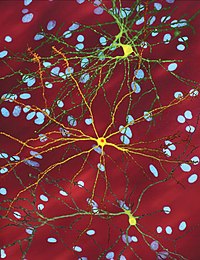
Photo from wikipedia
The use of whole‐genome sequencing (WGS) has accelerated the pace of gene discovery and highlighted the need for open and collaborative data sharing in the search for novel disease genes… Click to show full abstract
The use of whole‐genome sequencing (WGS) has accelerated the pace of gene discovery and highlighted the need for open and collaborative data sharing in the search for novel disease genes and variants. GeneMatcher (GM) is designed to facilitate connections between researchers, clinicians, health‐care providers, and others to help in the identification of additional patients with variants in the same candidate disease genes. The Illumina Clinical Services Laboratory offers a WGS test for patients with suspected rare and undiagnosed genetic disease and regularly submits potential candidate genes to GM to strengthen gene–disease relationships. We describe our experience with GM, including criteria for evaluation of candidate genes, and our workflow for the submission and review process. We have made 69 submissions, 36 of which are currently active. Ten percent of submissions have resulted in publications, with an additional 14 submissions part of ongoing collaborations and expected to result in a publication.
Journal Title: Human Mutation
Year Published: 2022
Link to full text (if available)
Share on Social Media: Sign Up to like & get
recommendations!